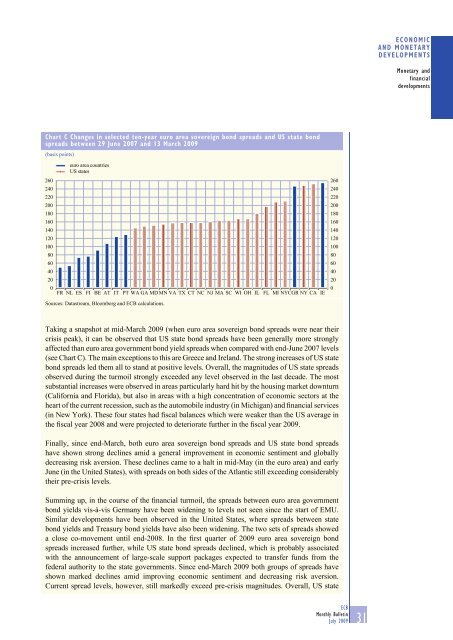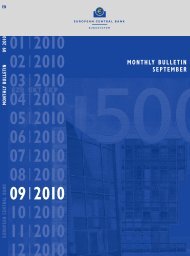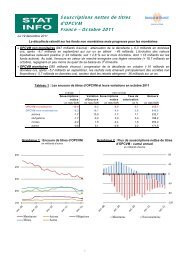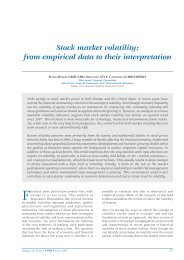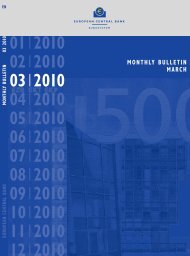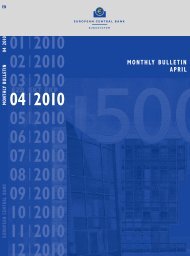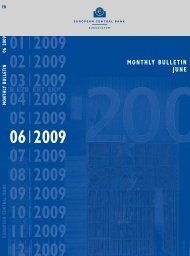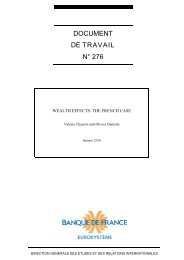Monthly Bulletin July 2009 - Banque de France
Monthly Bulletin July 2009 - Banque de France
Monthly Bulletin July 2009 - Banque de France
Create successful ePaper yourself
Turn your PDF publications into a flip-book with our unique Google optimized e-Paper software.
ECONOMIC<br />
AND MONETARY<br />
DEVELOPMENTS<br />
Monetary and<br />
financial<br />
<strong>de</strong>velopments<br />
Chart C Changes in selected ten-year euro area sovereign bond spreads and US state bond<br />
spreads between 29 June 2007 and 13 March <strong>2009</strong><br />
(basis points)<br />
260<br />
240<br />
220<br />
200<br />
180<br />
160<br />
140<br />
120<br />
100<br />
80<br />
60<br />
40<br />
20<br />
0<br />
euro area countries<br />
US states<br />
FR NL ES FI BE AT IT PT WA GA MD MN VA TX CT NC NJ MA SC WI OH IL FL MI NYCGR NY CA IE<br />
260<br />
240<br />
220<br />
200<br />
180<br />
160<br />
140<br />
120<br />
100<br />
80<br />
60<br />
40<br />
20<br />
0<br />
Sources: Datastream, Bloomberg and ECB calculations.<br />
Taking a snapshot at mid-March <strong>2009</strong> (when euro area sovereign bond spreads were near their<br />
crisis peak), it can be observed that US state bond spreads have been generally more strongly<br />
affected than euro area government bond yield spreads when compared with end-June 2007 levels<br />
(see Chart C). The main exceptions to this are Greece and Ireland. The strong increases of US state<br />
bond spreads led them all to stand at positive levels. Overall, the magnitu<strong>de</strong>s of US state spreads<br />
observed during the turmoil strongly excee<strong>de</strong>d any level observed in the last <strong>de</strong>ca<strong>de</strong>. The most<br />
substantial increases were observed in areas particularly hard hit by the housing market downturn<br />
(California and Florida), but also in areas with a high concentration of economic sectors at the<br />
heart of the current recession, such as the automobile industry (in Michigan) and financial services<br />
(in New York). These four states had fiscal balances which were weaker than the US average in<br />
the fiscal year 2008 and were projected to <strong>de</strong>teriorate further in the fiscal year <strong>2009</strong>.<br />
Finally, since end-March, both euro area sovereign bond spreads and US state bond spreads<br />
have shown strong <strong>de</strong>clines amid a general improvement in economic sentiment and globally<br />
<strong>de</strong>creasing risk aversion. These <strong>de</strong>clines came to a halt in mid-May (in the euro area) and early<br />
June (in the United States), with spreads on both si<strong>de</strong>s of the Atlantic still exceeding consi<strong>de</strong>rably<br />
their pre-crisis levels.<br />
Summing up, in the course of the financial turmoil, the spreads between euro area government<br />
bond yields vis-à-vis Germany have been wi<strong>de</strong>ning to levels not seen since the start of EMU.<br />
Similar <strong>de</strong>velopments have been observed in the United States, where spreads between state<br />
bond yields and Treasury bond yields have also been wi<strong>de</strong>ning. The two sets of spreads showed<br />
a close co-movement until end-2008. In the first quarter of <strong>2009</strong> euro area sovereign bond<br />
spreads increased further, while US state bond spreads <strong>de</strong>clined, which is probably associated<br />
with the announcement of large-scale support packages expected to transfer funds from the<br />
fe<strong>de</strong>ral authority to the state governments. Since end-March <strong>2009</strong> both groups of spreads have<br />
shown marked <strong>de</strong>clines amid improving economic sentiment and <strong>de</strong>creasing risk aversion.<br />
Current spread levels, however, still markedly exceed pre-crisis magnitu<strong>de</strong>s. Overall, US state<br />
ECB<br />
<strong>Monthly</strong> <strong>Bulletin</strong><br />
<strong>July</strong> <strong>2009</strong><br />
31


